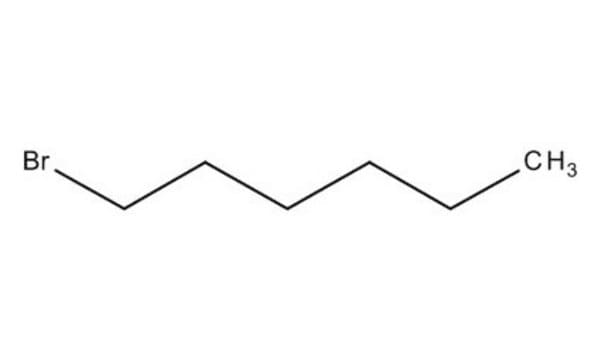398276
Diisopropyl ether
contains either BHT or hydroquinone as stabilizer, ACS reagent, ≥99.0%
Synonyme(s) :
Isopropyl ether
About This Item
Produits recommandés
Qualité
ACS reagent
Niveau de qualité
Densité de vapeur
3.5 (vs air)
Pression de vapeur
120 mmHg ( 20 °C)
Pureté
≥99.0%
Forme
liquid
Température d'inflammation spontanée
827 °F
Contient
either BHT or hydroquinone as stabilizer
Limite d'explosivité
1-21 %, 100 °F
Impuretés
≤0.0007 meq/g Titr. acid
≤0.05% Peroxide (as C6H14O2)
Résidus d'évap.
≤0.01%
Couleur
APHA: ≤25
Indice de réfraction
n20/D 1.367 (lit.)
Point d'ébullition
68-69 °C (lit.)
Pf
−85 °C (lit.)
Densité
0.725 g/mL at 25 °C (lit.)
Chaîne SMILES
CC(C)OC(C)C
InChI
1S/C6H14O/c1-5(2)7-6(3)4/h5-6H,1-4H3
Clé InChI
ZAFNJMIOTHYJRJ-UHFFFAOYSA-N
Vous recherchez des produits similaires ? Visite Guide de comparaison des produits
Description générale
Application
- Resolution of secondary alcohols.
- Enantioselective acylation of 1-phenethylamine.
- Synthesis of aliphatic and aromatic cyanohydrins.
Mention d'avertissement
Danger
Mentions de danger
Conseils de prudence
Classification des risques
Flam. Liq. 2 - STOT SE 3
Organes cibles
Central nervous system
Risques supp
Code de la classe de stockage
3 - Flammable liquids
Classe de danger pour l'eau (WGK)
WGK 1
Point d'éclair (°F)
-20.2 °F - closed cup
Point d'éclair (°C)
-29 °C - closed cup
Certificats d'analyse (COA)
Recherchez un Certificats d'analyse (COA) en saisissant le numéro de lot du produit. Les numéros de lot figurent sur l'étiquette du produit après les mots "Lot" ou "Batch".
Déjà en possession de ce produit ?
Retrouvez la documentation relative aux produits que vous avez récemment achetés dans la Bibliothèque de documents.
Les clients ont également consulté
Protocoles
A guide to create solvent systems used for the thin-layer chromatography assay of Novabiochem products.
A guide to create solvent systems used for the thin-layer chromatography assay of Novabiochem products.
A guide to create solvent systems used for the thin-layer chromatography assay of Novabiochem products.
A guide to create solvent systems used for the thin-layer chromatography assay of Novabiochem products.
Notre équipe de scientifiques dispose d'une expérience dans tous les secteurs de la recherche, notamment en sciences de la vie, science des matériaux, synthèse chimique, chromatographie, analyse et dans de nombreux autres domaines..
Contacter notre Service technique










